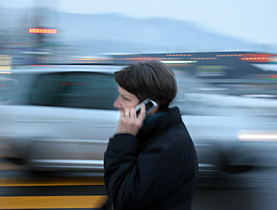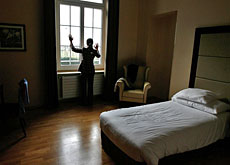Are we all running out of time?

"Time is money", "speed is of the essence" – phrases that might well sum up 21st century lifestyles.
Do we need time pressure to keep us going or are we pushing ourselves to the point of collapse? The “nonstop” exhibition in Lenzburg near Zurich hopes to provide some answers.
“We live in a high-speed society and acceleration in everyday life is very obvious,” said Beat Hächler, co-director of the Stapferhaus Lenzburg, where the exhibition has just opened.
“It’s part of this experience that we don’t really have any time to reflect on this, we just react, we are always in motion,” he told swissinfo.
The display offers much evidence that our lives have become a lot faster. In the “speedmasters” section, we learn that the Swiss Post can now get through up to 40,000 letters per hour with machines, earlier it was just 1,500 per hour by hand.
The Swiss Stock Exchange makes around 3,000 transactions per second, compared with just 45 per second in 1996.
Speed, say businesses, is what keeps us competitive in a globalised economy and industrialised society.
Speeding along
“We had a lot of contact with industries and administrations and they all say that the speed we have to work to is really at the limit, that it’s really a problem to keep up this speed in a healthy way,” said Hächler.
“On the other hand, we have the examples of China and southeast Asia and we have the impression that there speed is much higher and that we are too slow.”
Timesaving devices have had a great impact on our personal lives. Ready meals and household appliances have given us more free time.
But some innovations, such as the mobile phone and emails, are putting us under time stress.
This is neatly illustrated through a composition of 24 sounds, which can be heard in the “rush hour” room. It starts with the lone sound of water dropping and rises to a thundering crescendo of ring tones, computers, photocopiers, trains and footsteps.
“It’s like an immersive experience, the sound is travelling round your head,” its composer, the German sound artist Peter Kiefer, told swissinfo. “Most of the people come out of the room, saying “Phew! It’s really powerful'”.
Playing with fire
So are we all – as is suggested in the flames logo of the exhibition – playing with fire? Some experts certainly think so.
“We are running out of time, we are facing a temporal collapse,” warns German sociology professor Hartmut Rosa, who is quoted in the display.
For time expert Karlheinz Geissler, people have to be careful. “When we work out time in terms of money, we are lost as human beings. It is time to back-pedal in the storm of acceleration. Benches not banks, free time not funds,” he is cited as saying.
Time-out
Some experts think it’s a matter of getting the flames under control. “You can’t just put the brakes on the speed of life. It’s not a bad thing to be rushing around. You sometimes just need to withdraw from this fast rhythm,” notes the philosopher Wilhelm Schmid.
This need to find a balance between positive stress and burnout explains the rise of buzzwords like, “time-out”, “work-life balance” and, particularly in the German-speaking world, “wellness”, meaning relaxation and wellbeing.
Those visitors who score highly in the stress test offered in the exhibition may well appreciate the time tips given by 12 people in the know, including a yoga teacher, a time management expert and a time philosopher, in the “check-up” section.
In addition, video clips of young children cutting up paper or the elderly taking lunch – all in real time – serve as a reminder that for some, this nonstop society simply passes them by.
Time for reflection
“The most important thing is that you have two to three hours to think about your own speed, is it really chosen or are you being forced to be so quick?” Hächler said.
For this reason, those coming to the display are encouraged to leave their watches and their mobile phones in special lockers and enter a “time-free” zone.
That we are dictated by time becomes clear – this swissinfo journalist on several occasions looked at her naked wrist – and at the end of the exhibition visitors are invited to guess how much time they have spent there. Those in a hurry may even ask to be given a time reminder by staff, if necessary.
Hächler is hoping that this might bring about a change in behaviour, at least for a time.
“We try to seduce people to forget time and to spend a lot of hours here and perhaps that they will miss all their trains!” he said.
swissinfo, Isobel Leybold-Johnson in Lenzburg
“Nonstop – an exhibition about the speed of life” runs in the Zeughausareal in Lenzburg until November 29, 2009.
It is organised by the Stapferhaus, a cultural institution which is interested in modern-day issues. It is situated in Lenzburg, in the central Swiss canton of Aargau, 30km west of Zurich.
The 1,000m² display is divided into sections and takes place over different levels. For example, those in a hurry to enter can use a fireman’s pole to slide down to the ground level.

In compliance with the JTI standards
More: SWI swissinfo.ch certified by the Journalism Trust Initiative



You can find an overview of ongoing debates with our journalists here. Please join us!
If you want to start a conversation about a topic raised in this article or want to report factual errors, email us at english@swissinfo.ch.